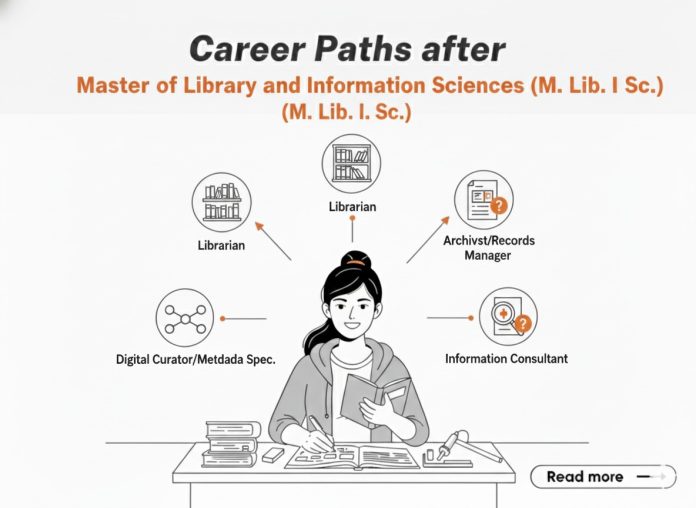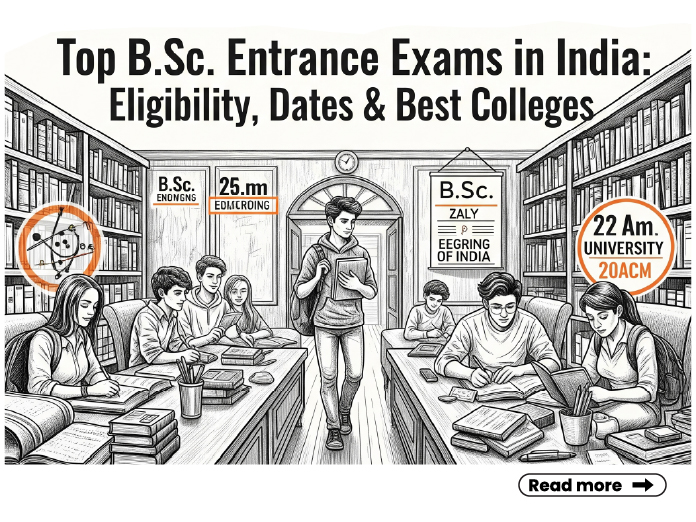- Introduction
- What is the Scope of M. Lib. I. Sc. in Today’s World?
- Why M. Lib. I. Sc. is a Smart Career Choice Today?
- Key Domains and Advanced Topics in M. Lib. I. Sc.
- Key Skills to Succeed in M. Lib. I. Sc.
- Emerging Technologies in Library & Information Sciences
- Career Options After M. Lib. I. Sc.
- Scope and Salary Trends for M. Lib. I. Sc. Graduates
- Top Recruiters That Hire M. Lib. I. Sc. Students
- What After Graduation? Higher Studies & Certifications
- Final Thoughts
- Frequently Asked Questions (FAQs)
Why Choose Master of Library and Information Sciences (MLIS) for Your Career?
The Master of Library and Information Sciences (MLIS) is a postgraduate degree designed for students passionate about managing knowledge, organizing information, and contributing to the world of education, research, and digital information systems. This program goes far beyond the traditional concept of libraries being just about books; it trains students to become information professionals capable of handling digital databases, archives, research repositories, and modern information management systems.
In today’s knowledge-driven world, the demand for skilled MLIS graduates is rising in universities, research organizations, corporate sectors, media houses, and even IT companies. Professionals with this degree play a critical role in making information accessible, reliable, and user-friendly whether it is in academic settings, public libraries, digital archives, or knowledge hubs of global corporations.
Choosing MLIS is not simply about becoming a librarian; it’s about stepping into the dynamic world of information science, where you learn to integrate technology, manage data, and support innovation in education and research.
At reputed universities like Lovely Professional University (LPU), the MLIS program is designed in consultation with industry experts. Students not only study traditional areas like cataloguing and reference services but also gain exposure to digital libraries, information retrieval systems, data curation, knowledge management, and AI-based library tools. The program equips graduates to handle both physical and digital information environments, preparing them for diverse careers across industries.
What is the Scope of M. Lib. I. Sc. in Today’s World?
The scope of Master of Library and Information Sciences (MLIS) is expanding rapidly, thanks to the digital transformation of the information sector. Traditionally, MLIS graduates worked in academic and public libraries, but now their roles extend into corporate information centers, digital content management, data analytics, research organizations, and global knowledge hubs.
With the explosion of online education, e-learning platforms, and digital content archives, the importance of professionals who can manage and structure information has multiplied. MLIS graduates find opportunities in:
- Academic Libraries – Supporting research scholars, professors, and students with updated resources.
- Digital Libraries & Repositories – Managing digital databases, e-books, online journals, and institutional repositories.
- Corporate Knowledge Centers – Assisting companies in organizing internal data, research findings, and knowledge-sharing platforms.
- Archives & Records Management – Preserving historical documents, manuscripts, and government data.
- Information Technology (IT) Sector – Collaborating on projects related to data curation, digital cataloguing, and knowledge management systems.
- Publishing & Media – Managing editorial archives, content libraries, and research databases.
According to industry trends, information science is now recognized as one of the fastest-growing professional fields worldwide. Organizations are hiring MLIS graduates not just as librarians, but as information managers, digital curators, and knowledge strategists.
| Did You Know?
UNESCO reports that more than 50% of the world’s libraries have already digitized a significant portion of their collections, creating high demand for MLIS professionals skilled in digital curation and e-resource management. |
Why M. Lib. I. Sc. is a Smart Career Choice Today?
Wondering why MLIS Course is considered a smart career choice in today’s era? The answer lies in its relevance, adaptability, and future scope in a world where knowledge and data are the most valuable resources. Here are some key reasons why this degree stands out:
1. High Demand for Information Professionals
As knowledge creation grows across industries, trained professionals are needed to manage this information. From schools and universities to multinational companies and government agencies, MLIS graduates ensure smooth knowledge management.
2. Diverse Career Paths
Unlike conventional degrees that limit you to one field, an MLIS degree opens doors to careers in academia, IT, corporate knowledge centers, archives, media, publishing, and international organizations.
3. Future-Proof Skills
The rise of digital transformation, AI, and big data ensures that MLIS graduates will always be relevant. Managing digital repositories, working with AI cataloguing systems, and building data-driven knowledge platforms are future-proof skills that keep professionals ahead.
4. Global Opportunities
With the expansion of digital learning platforms and international collaborations, MLIS graduates are sought after worldwide. Countries like the USA, Canada, UK, and Australia actively recruit library and information science professionals for universities, research centers, and corporate organizations.
5. Professional Growth & Stability
MLIS graduates often enjoy stable government jobs as well as dynamic corporate careers. They can also pursue higher studies such as Ph.D. in Library and Information Sciences or certifications in digital archiving, ensuring steady professional growth.
At institutions like LPU, MLIS students not only gain academic knowledge but also engage in internships, research projects, and live training with digital library platforms. This practical approach ensures career readiness from day one.
Key Domains Covered in Master of Library and Information Sciences (MLIS)
The MLIS curriculum is designed to balance both traditional library sciences and modern information technologies. Students gain expertise in managing physical collections while also mastering tools for digital and electronic resource management.
Some of the core domains covered in MLIS include:
- Library Management & Administration – Planning, organizing, and managing academic, public, or corporate libraries.
- Cataloguing & Classification – Learning how to systematically organize books, journals, and digital resources for easy retrieval.
- Information Retrieval Systems – Using software tools to manage databases, research repositories, and online information portals.
- Knowledge Organization – Structuring data and resources for research, education, and public access.
- Digital Libraries & e-Resources – Managing e-books, online journals, open access repositories, and digital archives.
- Research Methodology – Conducting research, analyzing trends, and publishing scholarly papers.
- Archiving & Records Management – Preserving historical documents, manuscripts, and digital records for long-term use.
- Information & Communication Technology (ICT) in Libraries – Applying computer applications, AI, and cloud-based tools for efficient knowledge systems.
At universities like LPU, the MLIS program also includes hands-on training with digital library software (like KOHA, DSpace, Greenstone), preparing students for global careers in knowledge and information management.
Skills You’ll Gain During MLIS
Pursuing an MLIS degree is not just about academics; it’s about building practical skills that employers value across industries. Graduates are trained to handle both traditional library systems and cutting-edge digital technologies.
Here are the key skills you’ll develop:
1. Technical & Digital Skills
- Mastery of digital library platforms (KOHA, DSpace, Libsys).
- Understanding of metadata, indexing, and digital cataloguing.
- Basics of AI, big data, and machine learning in information systems.
2. Research & Analytical Skills
- Conducting academic and industrial research.
- Analyzing large data sets to extract meaningful insights.
- Assisting researchers, scholars, and corporate professionals with information retrieval.
3. Communication & Interpersonal Skills
- Guiding users in accessing relevant information.
- Strong written and verbal communication for research and academic collaborations.
- Networking with global information professionals.
4. Management & Leadership Skills
- Planning and managing large knowledge centers.
- Overseeing staff, budgeting, and administration in libraries.
- Leading digital transformation projects in organizations.
5. Problem-Solving & Innovation
- Designing creative solutions for knowledge sharing.
- Developing digital archives and open-access systems.
- Innovating with new technologies to simplify access to information.
| Did You Know?
A survey by the American Library Association (ALA) found that over 70% of modern libraries worldwide now require digital technology expertise, making tech-driven MLIS graduates highly employable. |
Emerging Technologies in Library and Information Sciences
The MLIS field is rapidly evolving due to digital transformation and technological innovation. Information professionals today are not only custodians of books but also tech-enabled knowledge managers who use advanced tools to organize and distribute information.
Some of the emerging technologies shaping MLIS are:
- Artificial Intelligence (AI) in Libraries – AI-powered cataloguing, chatbots for user queries, and automated indexing systems.
- Big Data & Analytics – Helping organizations manage and analyze vast amounts of data for decision-making.
- Cloud Computing – Enabling remote access to resources, e-libraries, and digital archives worldwide.
- Blockchain for Data Security – Ensuring transparent, secure, and tamper-proof record management.
- Augmented & Virtual Reality (AR/VR) – Creating immersive educational experiences in digital learning libraries.
- Mobile Applications for Libraries – Allowing users to access books, journals, and repositories via mobile devices.
- Open Access Publishing – Promoting free access to research papers and scholarly articles across the globe.
These advancements show that MLIS graduates are no longer confined to traditional roles they are becoming digital innovators, data specialists, and global information managers.
At institutions like LPU, students gain hands-on exposure to these technologies through workshops, live projects, and collaborations with research organizations. This ensures that graduates are industry-ready and globally competent.
Career Options After M. Lib. I. Sc. (MLIS)
One of the biggest strengths of the MLIS degree is the diversity of career options it offers. Graduates are not limited to becoming librarians; instead, they can explore opportunities in education, research, IT, corporate, publishing, and media industries.
Here are the top career options after MLIS:
- Academic Librarian – Manage resources in schools, colleges, and universities, supporting both faculty and students.
- Corporate Knowledge Manager – Organize internal knowledge databases and research information for multinational companies.
- Digital Librarian – Handle e-books, e-journals, and digital repositories for academic or corporate organizations.
- Archivist/Records Manager – Preserve historical, cultural, and government documents in digital and physical formats.
- Information Analyst/Research Consultant – Provide research assistance and data analysis for organizations and scholars.
- Data Curator – Organize, annotate, and maintain datasets for research institutions or corporations.
- Content/Information Specialist – Work in publishing houses, media organizations, and OTT platforms to manage archives.
- Knowledge Strategist in IT Firms – Assist tech companies with knowledge mapping and information systems.
- Public/Community Librarian – Work with NGOs, community centers, and public institutions to provide open-access resources.
- Teaching & Academia – Become a faculty member in Library and Information Science programs or pursue a Ph.D.
| Did You Know?
According to the International Federation of Library Associations (IFLA), the role of information professionals is now considered a critical pillar of global education and research systems, making MLIS one of the most future-relevant degrees. |
Salary Trends After M. Lib. I. Sc.
The salary package after MLIS varies depending on the role, industry, and country of employment. With digital transformation, salaries have seen significant growth in recent years, especially in corporate and IT sectors.
Here’s an overview of salary trends:
- Academic Librarians (India): ₹3.5 – ₹6 LPA (entry level); senior librarians in universities can earn up to ₹12 LPA.
- Corporate Knowledge Managers: ₹6 – ₹15 LPA depending on the organization.
- Digital Librarians/Information Specialists: ₹4 – ₹8 LPA in India; $50,000 – $80,000 per year in the US.
- Archivists & Records Managers: ₹4 – ₹7 LPA; higher packages in government organizations and research institutions.
- Research Consultants & Data Curators: ₹5 – ₹10 LPA depending on expertise and experience.
- Teaching & Academia: ₹4 – ₹9 LPA; professors with Ph.D. in Library Science may earn ₹12–20 LPA in top universities.
Internationally, MLIS graduates earn higher pay scales due to global demand:
- USA/Canada: $55,000 – $95,000 annually.
- UK/Australia: £40,000 – £70,000 per year.
- Middle East: AED 80,000 – AED 120,000 annually (library & knowledge management specialists).
The salary prospects highlight that MLIS is not just a stable career option but also a rewarding one, especially for those skilled in digital information management and emerging technologies.
Top Recruiters for MLIS Graduates
MLIS graduates are in demand across academic institutions, research organizations, IT firms, publishing houses, and government agencies. The recruiters vary from universities to corporate giants.
Some of the top recruiters for MLIS graduates include:
Academic & Research Institutions
- Indian Institute of Technology (IITs) & National Institutes
- Central and State Universities
- Research labs like CSIR, ICAR, DRDO
- National Archives of India
- UNESCO, World Bank libraries
Corporate & IT Companies
- Infosys, TCS, Wipro (knowledge management roles)
- IBM, Accenture, Deloitte (information analysis & consulting)
- Publishing companies and e-learning platforms (Pearson, Elsevier, Coursera)
Public Libraries & Government Organizations
- State Central Libraries and National Digital Library of India
- Public sector undertakings (ONGC, BHEL, RBI, ISRO)
- Ministry of Culture and Government Research Wings
Media & Publishing Houses
- The Hindu, Times Group, and other media houses (editorial and archival roles)
- OTT platforms like Netflix, Hotstar, and Amazon Prime (content archives and curation)
At institutions like LPU, students often get placed in both academic libraries and corporate knowledge hubs, as the university has strong industry collaborations ensuring exposure to both traditional and modern roles.
Higher Studies and Research Opportunities After MLIS
Completing an MLIS degree is not the end of the road; many students choose to pursue higher studies and research for academic excellence and career advancement.
Some of the higher education and research options after MLIS include:
- Ph.D. in Library and Information Science – For those interested in deep research, teaching, or academic careers.
- M.Phil. (Library & Information Science) – A research-focused program for candidates who wish to specialize in specific domains like digital curation, metadata, or knowledge systems.
- Postgraduate Diplomas/Certifications – Short-term specialized courses in areas like:
- Digital Archiving & Metadata
- Data Analytics & Knowledge Management
- Information Technology in Libraries
- Open Access Publishing & Research Data Management
- UGC-NET/JRF – Qualifying for NET/JRF opens doors for lectureship and funded research projects in India.
- International Opportunities – MLIS graduates often apply for Fulbright Fellowships, DAAD Scholarships (Germany), or Commonwealth Scholarships (UK) for advanced research abroad.
At universities like LPU, students are encouraged to participate in conferences, workshops, and research projects, preparing them for both academic and industry research opportunities.
Final Thoughts: Why MLIS is the Right Step for Knowledge Leaders
The Master of Library and Information Sciences (MLIS) is more than just a postgraduate degree; it is a gateway to becoming a leader in the knowledge economy. Whether your passion lies in libraries, digital archives, research, teaching, or corporate knowledge hubs, this degree equips you with the right balance of traditional expertise and digital skills.
From academic librarianship to IT driven knowledge management, the career possibilities are vast and future-proof. With digital technologies shaping every sector, MLIS graduates are becoming essential contributors in education, research, government, corporate, and global organizations.
At institutions like LPU, the program stands out because of its industry-aligned curriculum, digital library exposure, research opportunities, and strong placement support. Students not only gain professional knowledge but also develop leadership qualities that prepare them for global opportunities.
In today’s data-driven world, an MLIS degree ensures you’re not just keeping up but staying ahead as a knowledge professional of the future.
Frequently Asked Questions (FAQs)
Q1. What is the duration of the MLIS program?
The MLIS program usually takes 1 year (2 semesters) in India, but in some universities abroad, it can extend to 1.5–2 years.
Q2. What are the eligibility criteria for MLIS?
Candidates generally need a Bachelor’s degree in Library and Information Science (BLIS or B.Lib.I.Sc.) with minimum required marks (usually 50%).
Q3. Is MLIS only for those who want to become librarians?
No. While librarianship is one option, MLIS graduates also work in digital information systems, archives, IT firms, research organizations, and corporate knowledge management.
Q4. Does MLIS have good scope abroad?
Yes. Countries like the USA, UK, Canada, Australia, and Middle East nations actively recruit MLIS professionals for universities, research centers, and corporate organizations.
Q5. What skills should I focus on to excel in MLIS?
Focus on digital library systems (KOHA, DSpace), cataloguing, metadata, research skills, data curation, and ICT tools. Strong communication and analytical skills also make a big difference.
Q6. What are the future trends in Library and Information Sciences?
Emerging trends include AI in libraries, blockchain for data security, cloud-based knowledge management, and open-access publishing—all of which make this field dynamic and future-ready.




![Career Paths After B.Sc. Information Technology [Lateral Entry] Career Paths after B.Sc. Information Technology [Lateral Entry]](https://www.lpu.in/blog/wp-content/uploads/2026/01/Career-Paths-after-B.Sc_.-Information-Technology-Lateral-Entry-218x150.png)









